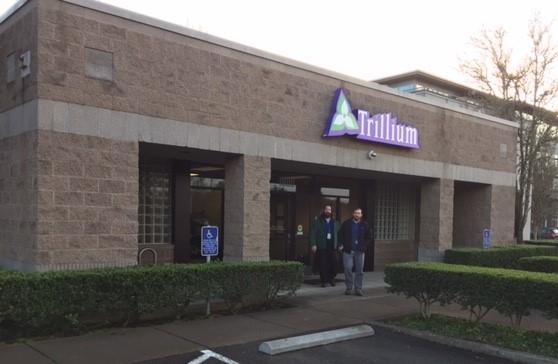
Updated Wednesday at 5:07 p.m.
Portland’s major Medicaid insurer, Health Share of Oregon, may not be the only player in town for long.
Trillium Community Health Plan, the major Medicaid insurer in Eugene with about 85,000 members, plans to expand into Multnomah, Washington, Clackamas, Marion and Polk counties, the Oregon Health Authority announced Wednesday. It also intends to cover all of Coos and Douglas counties. At stake are nearly 350,000 members in the Portland area and nearly 150,000 in the other four counties.
The news came a day after Oregon Health Authority officials released changes to the prospective Medicaid insurers who announced their intention to apply for a piece of the state’s $5 billion Medicaid procurement. That release did not mention Trillium’s recent decision to try to expand.
The announcement drew a mixed reaction, including concerns that the two insurers have different priorities for health reform and would burden patients and providers.
Trillium has been the source of scrutiny for Oregon lawmakers after the nationwide for-profit health giant Centene Corp. bought the coordinated care organization for $109 million at the end of 2015.
Centene took ownership of the $41 million in reserves that Trillium received under the Oregon Health Plan. Trillium’s group of 217 shareholders divided the $109 million in sale proceeds among themselves, with some shareholders receiving multi-million-dollar payouts. Critics decried the process, saying Oregon Health Plan money should be used to benefit low-income patients, not provide profits to owners of the for-profit insurer.
Trillium spokeswoman Debi Farr did not respond to multiple requests for comment by publication.
Analysts expect Centene, a publicly traded company, to see an annual average earnings growth rate of more than 13 percent a year over the next five years.
Trillium’s expanded coverage would land the for-profit Medicaid payer in the state’s largest market, where nonprofit Health Share of Oregon currently is the only major payer.
The Portland metro area previously had two coordinated care organizations, but FamilyCare Inc. went out of business in 2019, following a rate dispute with the state. FamilyCare accused the state of setting unfair rates, putting them at a disadvantage to Health Share, while the state accused FamilyCare of overspending. The lawsuit is sitting in the U.S. Appellate Court and could take up to three years to be heard.
FamilyCare officials accused the state of favoring Health Share and angling to have one coordinated care organization in the region, but Oregon health officials have repeatedly said they are agnostic about how many Medicaid payers are in a region as long as they can financially manage the risk over covering patients in the region.
Having more than one Medicaid payer in the Portland metro area could prove difficult for patients and providers, said Eric Hunter, CEO of Care Oregon, a subsidiary of Health Share.
Health Share and Trillium have different models, Hunter said, which means county partners, providers and patients will have to navigate two systems.
Hunter said Health Share’s partners have worked hard to have a single voice in the community and that it’s possible Trillium and Health Share could have very different priorities.
“It splinters the ability to have to have a single community-wide voice in how we improve health care,” Hunter said.
Rep. Cedric Hayden, a Republican from Roseburg and vice chair of the House Health Committee, welcomed the competition.
“I support our Medicaid clients having the option to ‘vote with their feet,’” Hayden said in a text. “In other words, competition is good where it has the population to be supported.”
Health Share’s Interim CEO and chief medical officer, Maggie Bennington-Davis, said Health Share is laser focused on preparing their own application for the next Medicaid contract. She said she is not an expert on whether or not there are enough Medicaid patients in the area to make both organizations financially viable.
Health Share spokeswoman Stephanie Vandehey said it will be up to the Oregon Health Authority to decide at the end of the application process whether or not more than one Medicaid insurer can thrive in one region.
"We’re excited to move forward with our partners on pulling together an aspirational, community-driven application,"Vandehey said in a statement. "Our full attention is on serving our community and delivering high-quality health care experiences that improve health and reduce inequity for all (Oregon Health Plan) members in our region."
Oregon Health Authority spokesman Robb Cowie declined to comment for this story, saying the procurement process is still in the works. Applications for the next five-year contract are due April 22.
Lynne Terry contributed to this report.
Have a tip about health care? Contact Jessica Floum at [email protected].